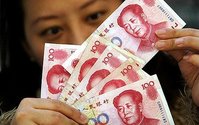
Those of you who are looking for a topic for a Discussion Board post might consider getting a copy of The World Is Flat: A Brief History of the Twenty-First Century. The author of the book is one of our country's most influential foreign affairs writers, New York Times columnist Thomas Friedman. I was impressed as usual with some of Friedman’s insights in an Op-Ed that he wrote yesterday in the New York Times (November 10) and I would like to share some excerpts:
Excerpts from: China: Scapegoat or Sputnik by Thomas Friedman.
Excerpts from: China: Scapegoat or Sputnik by Thomas Friedman.
“I still believe that when the history of this era is written, the trend that historians will cite as the most significant will not be 9/11 and the U.S. invasions of Afghanistan and Iraq. It will be the rise of China and India. How the world accommodates itself to these rising powers, and how America manages the economic opportunities and challenges they pose, is still the most important global trend to watch.
It really hits you when you see the supersize buildings sprouting in Shanghai, or when you look at the world through non-American eyes. Kishore Mahbubani, the dean of Singapore’s Lee Kuan Yew School of Public Policy, told me the other day that Asia right now “is the most optimistic place in the world.” More people have come out of poverty faster there — particularly in India and China — than at any time in the history of the world, and as a result, he notes, more people in Asia than anywhere else in the world today “wake up every morning sure that tomorrow is going to be better than yesterday.”…
Technology and globalization are flattening the global economic playing field today, enabling many more developing nations to compete for white-collar and blue-collar jobs once reserved for the developed world. This is one reason why growth in wages for the average U.S. worker has not been keeping pace with our growth in productivity and G.D.P.
“Economists call this phenomenon median wage stagnation,” noted The Financial Times. “Median measures give the best picture of what is happening to the middle class because, unlike mean or average wages, median wages are not pulled upwards by rapid gains at the top. As the joke goes: Bill Gates walks into a bar and, on average, everyone there becomes a millionaire. But the median does not change.”
Many Americans lately have started to get that joke, and it is one reason that with this new Democrat-led Congress we are likely to see a surge in protectionist legislation, more Wal-Mart bashing, a slowdown in free-trade expansion and increased calls for punitive actions if China doesn’t reduce its trade surplus — which surged to a record in October.
China, in other words, is inevitably going to move back to the center of U.S. politics, because it crystallizes the economic challenges faced by U.S. workers in the 21st century. The big question for me is, how will President Bush and the Democratic Congress use China: as a scapegoat or a Sputnik?
Will they use it as an excuse to avoid doing the hard things, because it’s all just China’s fault, or as an excuse to rally the country — as we did after the Soviets leapt ahead of us in the space race and launched Sputnik — to make the kind of comprehensive changes in health care, portability of pensions, entitlements and lifelong learning to give America’s middle class the best tools possible to thrive? A lot of history is going to turn on that answer, because if people don’t feel they have the tools or skills to thrive in a world without walls, the pressure to put up walls, especially against China, will steadily mount. “
I continue to believe that The World is Flat is worth a read or a listen if you want to understand globalization.
Extra Credit: What is the Chinese currency called? What is the current exchange rate between China’s currency and the U.S. dollar? Does China have a fixed or flexible exchange rate? If you are the first student to send me an e-mail (kwoodward@saddleback.edu) with the answer, you will be rewarded with two extra credit Discussion Board points. Only two points extra credit per student can be earned in any given week from the blog questions.
1 comment:
Sputnik or Scapegoat? I vote for scapegoat. I see a future that will blame the Chinese for loss of jobs. I remember when the Japanese were blamed for GM cutting jobs. They got the blame for U.S. Steel going out business.
Everyone forgot/ignored that our broken healthcare system was part of the problem. Everyone forgot that American cars were not of high quality. Everyone forgot that American workers productivity was lower then the Japanese.
The same will happen with China.
The congress and the next President will bash China till China starts building plants in Indiana, Ohio and start hiring Americans and paying them with cheap U.S. dollars.
The only problem with my prediction is the question of how long will China have a floating population and for how long will they keep buying U.S. Dollars to keep that floating population employed.
Post a Comment